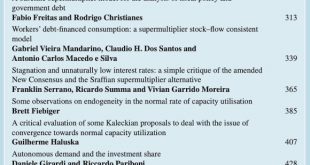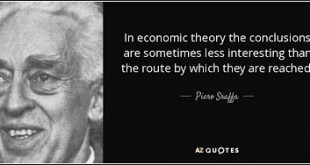[embedded content]A demand-led growth perspective of Indian development. Book available here. Comments by Alex Thomas.
Read More »Cycles: empirics and the supermultiplier theory
New paper on the empirical evidence of the relevance of the supermultiplier for explaining economic cycles by Ricardo Summa, Gabriel Petrini, and Lucas Teixeira. From the abstract:The demand-led supermultiplier growth model proposes that business investment is induced by income while autonomous expenditures determine economic growth. The most known versions of the model are presented at high levels of abstraction, focusing on general analytical properties and dynamic stability conditions....
Read More »New Working Paper: Keynes’s finance, the monetary and demand-led circuits: a Sraffian assessment
Keynes’s finance, the monetary and demand-led circuits: a Sraffian assessment Working Paper n.851 - Marzo 2021Sergio Cesaratto DEPS, USiena Riccardo Pariboni DEPS, USiena Abstract This paper aims to stimulate the convergence of the Sraffian approach to demand-led growth theory with insights from monetary circuit theory and stock-flow models. The first Sraffian contribution to this convergence we...
Read More »Autonomous demand, capacity utilization, and the supermultiplier
New issue of ROKE is out. Check out the free papers by Serrano, Summa and Garrido Moreira, and by Fiebiger, beyond the intro by Summa and Freitas.
Read More »Investment Rate, Growth and Accelerator Effect in the Supermultiplier Model: the case of Brazil
A new paper by Julia Braga, that she will present at the next Eastern Association Economic Meeting in Boston. From the abstract: "This paper investigates the role of demand in the productive investment evolution in the Brazilian economy. First, it assesses the long-run relationship between investment rate and GDP growth, taking annual data since 1962 until 2015. We then construct a “Final Demand” index and estimate its impact on productive investment growth rate, taking quarterly data...
Read More »Beyond the traditional monetary circuit
Slow posting will continue the rest of the Summer. Here a paper by Sergio Cesaratto that might be of interest. From the abstract: The paper is a contribution to a long-run theory of effective demand with elements from monetary circuit theory, Modern Monetary Theory and endogenous finance analysis. Some shortcomings of the still influential neo-Kaleckian growth model and monetary circuit theory are underlined, and the Sraffian supermultiplier is indicated as the most promising heterodox...
Read More »A Brief Sketch of the Classical-Keynesian Perspective
By David Fields, originally posted hereFrom a Classical-Keynesian perspective (Bortis, 1997, 2003), rates of interest regulate rates of profits (Panico, 1980, 1985), and, thus, real wages are endogenously determined. The presence of financial instruments, which represent titles to future flows of income, makes it so that the actual center of distributive conflict in capitalism lies not in the technical conditions of production, but is rather governed by the real rate of interest, which is...
Read More »A Clarification of the clarification of supermultipliers
After my post I got an email and post below by Franklin. Mind you, I still would refer to supermultiplier models as Kaldorian, and the models with autonomous investment as neo-Kaleckian. As Franklin notes Bortis, a Kaldorian and Sraffian, makes the transition to exogenous distribution, even if Kaldor himself didn't. Below the email and the post.Dear Matias:Great Post.Your use of the phrase “no independent investment function” to refer to induced investment models is unfortunately quite...
Read More »Kaldorian and Sraffian supermultipliers: a clarification
This is a post for those interested in demand-led theories of growth. Not long ago I wrote a post on misconceptions about Sraffian economics. Marc Lavoie sent me a nice email about it, and a recent paper he published in Metroeconomica (subscription required), which comments on a paper I wrote with Esteban Pérez (working paper available here). In his discussion of supermultiplier models, which put the multiplier and the accelerator together to explain -- not fluctuations of the level of...
Read More »Thirlwall’s Law debate in Investigación Económica
The other side Jaime Ros, with Pedro Hugo Clavijo, wrote a critique of Thirlwall's Law (in Spanish). Replies by Carlos Ibarra here, Esteban Pérez here and myself here. Their rejoinder here. All in Spanish. Haven't read the whole rejoinder yet (just got it), but for some reason they insist that the supermultiplier implies that exports are always the main source of autonomous demand.* Hm, that's weird. Just puzzled by that one. They should read Bortis and Serrano (this one with Fabio...
Read More » Heterodox
Heterodox



